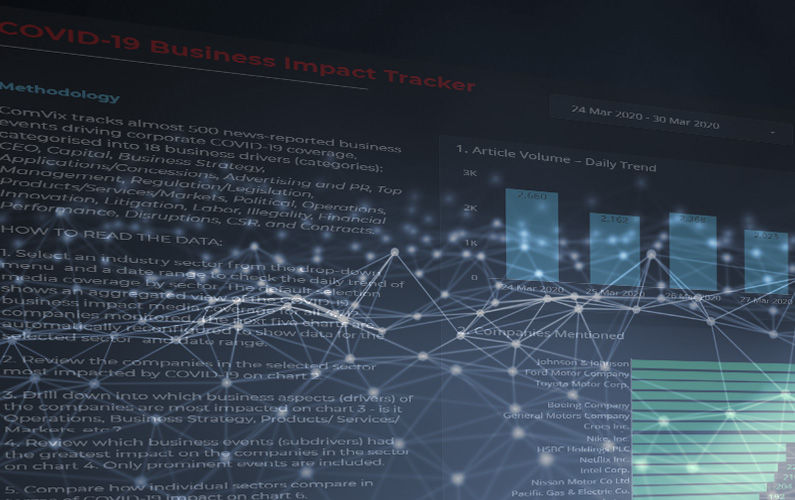Alongside medical professionals and government officials, the chief executive officers of the world’s most influential companies are some of the most commonly quoted spokespeople in the media debate around the coronavirus pandemic.
We decided to use the Commetric COVID-19 Business Impact Tracker to find the most often cited CEOs in the context of COVID-19. Our free tool uses rule-based natural language processing (NLP) and machine learning to track more than 450 types of news-reported business events that affect companies and industries during the pandemic.
We analysed 112,643 articles from 7,224 online media outlets for the period 15 January – 7 May 2020, covering most publicly-traded companies in the US and the UK.
We discovered that CEOs from the Financial Services industry were the most often quoted ones, followed by those from the Industrial, Health and Retail sectors:
Executives of financial services firms have often been actively involved in the frenetic media conversation around the coronavirus. With most media outlets having special teams specifically covering the pandemic, the cross-industry expertise of such professionals has secured them a crucial role in shaping the debate.
As with any uncertain business climate, the pandemic has led to some communication conundrums for banks and economic consultancies as they should be able to present themselves as competent enough in a situation full of economic puzzles. With this in mind, financial services firms have stepped up their thought leadership strategies.
Morgan Stanley CEO James Gorman was the most often cited banking spokesperson, as his forecast that coronavirus-induced recession could last through 2021 made many headlines.
He was followed by JPMorgan Chase & Co’s Jamie Dimon, widely seen as the face of the US banking sector, who said he expects a “bad recession” in 2020, and that the economic cost of the coronavirus will not evaporate quickly.
Financial Services also took the lead as the most active CSR sector, at least in terms of their media resonance, with HSBC and Wells Fargo being particularly prominent.
Within the industrial sector, the most frequently cited CEOs stemmed from the aerospace subsector, with David Calhoun, CEO of Boeing, being the most prominent spokesperson in the discussion as a whole.
One of Calhoun‘s most popular statements was that air traffic may not bounce back for two or three years. Boeing, the world’s largest commercial aircraft manufacturer, was also the most often mentioned company in the discussion around the coronavirus across all industries, as per our COVID-19 Business Impact Tracker.
Meanwhile, Walmart CEO Doug McMillon outlined how shopping patterns are serving as a reflection of how the coronavirus pandemic affects daily lives.
Some were more optimistic in their economic predictions: for instance, Berkshire Hathaway’s Warren Buffett offered reassurance that the U.S. economy will recover steadily: “We’ve faced tougher problems and the American miracle, the American magic, has always prevailed.”
The most often quoted Technology CEO was Apple’s Tim Cook who said that although his firm’s sales and profits beat Wall Street expectations, it was impossible to forecast overall results for the current quarter because of all the uncertainty.
Within the Health sector, almost all of the most frequently cited CEOs stemmed from Pharma, followed by a small number of Biotechnology executives.
Novartis’ Vas Narasimhan took the lead here: he said the Sandoz unit’s malaria, lupus and arthritis drug hydroxychloroquine is the company’s biggest hope against the virus.
Novartis‘ donations of that drug also made the company the most prominent healthcare player in a CSR context.

